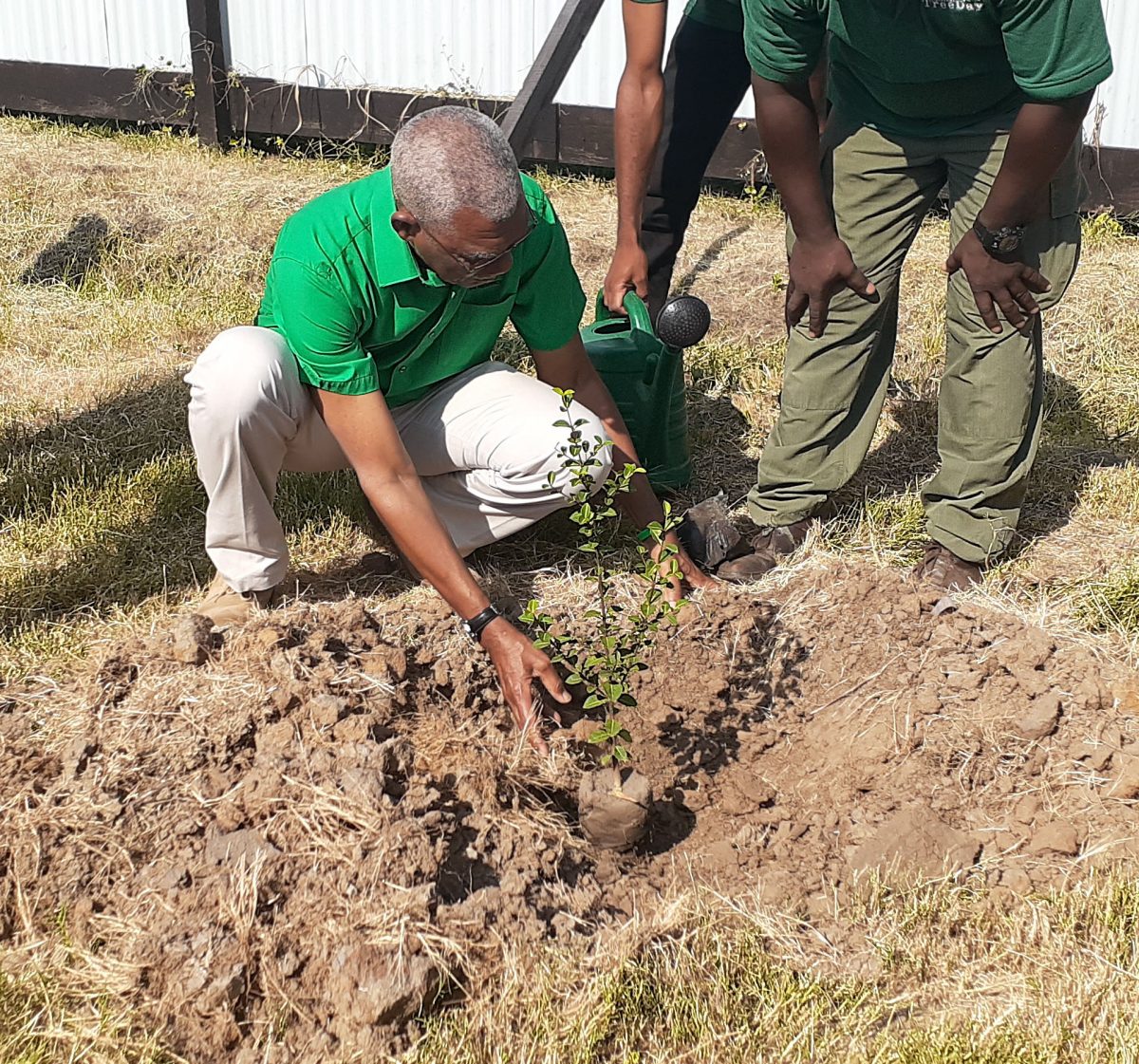
President David Granger planting the first tree at the National Tree Day 2019 observance at Union Village, Corentyne yesterday. (Bebi Oosman photo)
October 12 2019
President David Granger yesterday emphasised that Guyana must not only prepare for an oil economy but also prepare for the post-oil economy, which, he said, is expected to be fueled by agro-processing.
He was at the time speaking at the Ministry of Agriculture’s National Tree Day 2019 observance at Union Village, Corentyne. The event was held under the theme, ‘Time waits for no one, the best time to plant a tree is now’.
The president said that while first oil is expected next year, citizens should not get “drunk on oil.




“Don’t let us get drunk. Let us remain sober because we want to make sure that during that decade of development, every section, every sector, every segment of our economy and society will benefit from economic develop-ment,” Granger said. He added that the objectives of the oil decade is not to share out money but to make Guyana economi-cally reliant and self-sufficient.
“… the Green State Development Strategy has identified the production of fruits and vegetables as a growth pole, an area for change and improvement in our economy,” he said. “Government will continue to support the shift towards organic products in the cultivation of our fruits and vegetables,” the president added.
He then urged Guyanese to look forward to a decade that will lay the foundation of sustained progress and prosperity, saying that it will be a decade based on agricultural diversification and industrialisation. “Agriculture will not be neglected during the next decade. Food products not fuel products will remain the mainstay of our economy. Agro-processing will remain the mainstay, agro-processing will inten-sify during the decade. Our petroleum revenues are welcomed but they will be deployed to modernise the agriculture and other sectors of development. Oil don’t last forever…and one day, the people who used to buy oil [will] decide not to buy so much oil anymore so let us prepare not only for the oil economy but the post-oil economy when you will have to fall back to the same agriculture, the same trees that we have been using,” he asserted. Granger then emphasised the need for investment in agriculture and said that government will offer financial incentives to investors who are interested in promoting export-oriented agro-processing. He noted that agriculture, forestry and fisheries collectively account for 17.5 per cent of employment within Guyana.
Food security
According to Granger, he has long held the view that East Berbice-Corentyne has the land, expertise and experience to guarantee Guyana’s food security and make its residents prosperous. “…it can even guarantee the food security of the Eastern Caribbean,” he said.
The president said that food security is when food is available and accessible to every citizen in the country in large quantities and Guyana is fortunate because citizens enjoy a certain level of food security. “Our rice, our root crops, our vegetables – but some of these products are unevenly distributed, there are certainly some places where there is no food security or insufficient security, especially in some poor hinterland commu-nities – but we have the capacity and the capability to produce enough food, especially the food the Caribbean wants,” he said.
“We can give them everything they want and more. We have the capacity in Guyana to ensure improved access to really nutritional food and our population can be well fed if we address the deficiency that now exists in national food security,” he added.
Touching further on agro-processing, the presi-dent pointed out that sugar and rice are examples of agro-processed products. “Why can’t we extend processing to other com-modities?” he questioned while highlighting that agro-processing in some form or the other has sus-tained Guyana’s economy for several decades.
Meanwhile, Granger said that he has always held the opinion that Corentyne has a compara-tive advantage beyond sugar and rice and can venture into production of fruits and vegetables “… into coconut, into citrus, all these commodities can be produced on the Corentyne in large quantities.”
He said that Guyana exported fruits and vege-tables worth US$8 million last year, which is extremely below the country’s potential. According to him, an economist calculated that if Guyana had a more robust programme for agro-processing, “We could export US$250 million of agriculture produce. We could export more in agriculture produce that we export in sugar and rice by value.
“That is what we talking about when we talking about trees and agro-processing. We are talking about the new chapter in our economy, in our hinterland and rural village economy. We can go in more robustly into the packaging and bottling of foods and drinks using modern equipment on a large scale and that is one of the elements in our policy to ensure food security, of reducing food imports and increasing exports particularly in processed form,” he said.
The president emphasised that agro-processing can add value to primary products and help Guyana to be more prosperous while ensuring greater food security by increasing exports and adding value to the country’s food production and at the same time, reducing market uncertainties associated with primary produce.
He explained, “If you have a breadfruit tree and allow the breadfruit to fall on the ground, it will spoil but if you pick the breadfruit when it ripe and you make breadfruit chips, you can go by the Berbice Harbour Bridge and sell some breadfruit chips and plantain chips.
“It improves security by stimulating increased demand for food production by reducing crop losses due to spoilage,” he added.
Touching further on the Green State Development Strategy, he said it is a roadmap to making Guyana a green state as well as a roadmap to food security.
The president highlighted that every National Tree Day, his government travels to different regions to highlight the importance of trees and to also emphasise the importance of planting trees and educating the populace in the process. He told the gathering that trees are essential to human existence and to the perseverance of Guyana. “Trees provide products used by humans; clothing, food, housing, medicine; they provide protection through biodiversity, to our bountiful flora and fauna; they provide ecosystem services, regulating the water cycle, pollination, temperature modification, carbon synchronisation and air purification,” he said.
Trees also protect the sea defences, Granger observed. “Once the mangroves are destroyed, the sea will come rushing in. People mustn’t cut down those mangroves. Trees are on the seashore because it helps us to protect ourselves against the rising sea levels and the [water] rushing onto farmlands,” he said.
“I would like to see the day during my next term…when every single region has a protected area because every region has trees, has forests, and I’d like to see that every region could one day [say] no cutting here, no timber, no agriculture, these trees must be protected to preserve Guyana’s flora and fauna,” he said to cheers and applause.
Granger also expressed hope that protected areas are maintained and the trees are not jeopardised by excessive logging and mining. “We know that mining and logging could be a threat to the environment. We know that mining and logging could sometimes be responsible for air pollution, the loss of our biodiversity, the loss of our freshwater sources, the contamination of our oceans, the emission of greenhouse gases and the degradation of our land but logging and mining must be subjected to strict rules, they may be the main causes of deforestation and land degradation but they’re subject to regulation. There must be more land reclamation, more land reforestation and we must, at the level of the government and the Ministry of Natural Resources, ensure that we employ countermeasures to prevent the adverse effects of the extractive industries damaging our environment,” he asserted.
He also highlighted that farmers reap produce that allows them to earn an income to sustain their families and to generate exports and employment.
Meanwhile, Corentyne residents, including farmers and members of the PPP, protested yesterday’s event. Regional Vice Chairman Denis Deroop said that Granger was present in the region to celebrate National Tree Day but farmers are being victimised. “At present in the region, more than 1,000 acre of the region cash crop is under threat, dying out because of shortage of water. The canals are blocked and the government is not spending money to save the crops so we feel this exercise is a waste of money and waste of government resources,” he said. He added that the money used for the function could have been utilised to save the crops.
